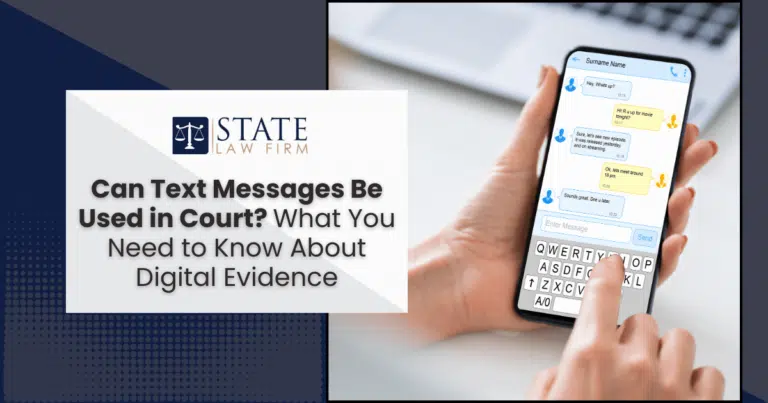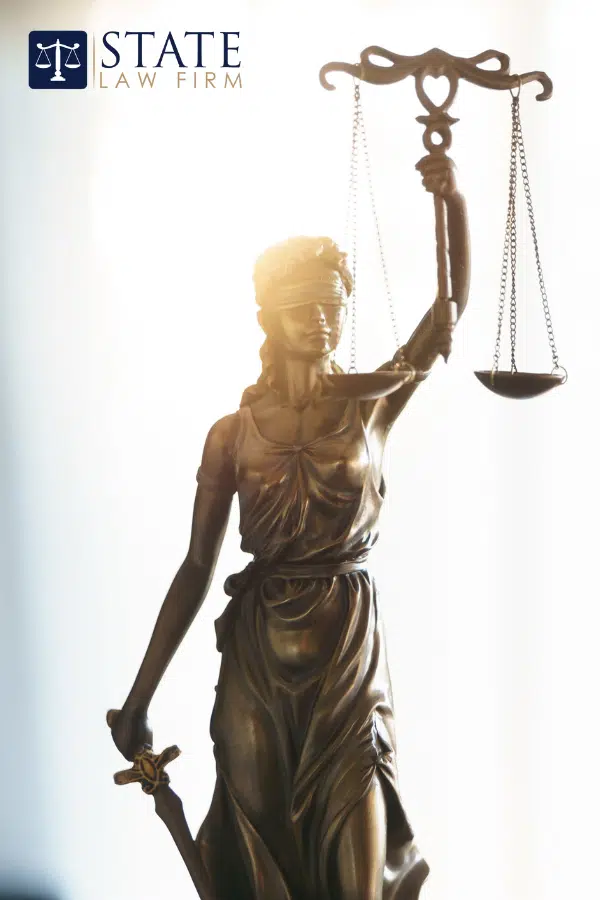In today’s digital age, our lives are increasingly intertwined with technology, and text messages have become a primary form of communication. Whether discussing personal matters, work-related issues, or even resolving disputes, text messages often hold critical information that could play a pivotal role in legal proceedings. In fact, a study revealed that digital evidence, including text messages, is presented in over 85% of court cases involving communication disputes (source). This highlights how crucial it is to understand the role of text messages as digital evidence.
At State Law Firm, we recognize the growing importance of digital evidence in building strong personal injury cases. Our team of young, dynamic attorneys, based in Sherman Oaks, is passionate about evolving into cutting-edge litigators who tackle even the most challenging legal matters. Whether you’re navigating premises liability or another type of case, our boutique firm is dedicated to guiding clients through every legal nuance. If you’re exploring your legal options, you can learn more about how we support clients here.
This article delves into the essentials of using text messages as evidence in court. From understanding their admissibility and legal framework to exploring challenges and best practices for preserving such evidence, we aim to provide a comprehensive resource to help you navigate the complexities of digital evidence. Let’s explore how text messages can shape the outcomes of your case and what you need to know to use them effectively.
Understanding Text Messages as Digital Evidence
Text messages are a significant form of digital evidence in today’s legal landscape. They can serve as key evidence in personal injury cases, contract disputes, or even criminal trials. However, their admissibility in court depends on meeting specific legal standards.
Digital evidence, including text messages, must meet criteria such as relevance and authenticity to be considered admissible. Courts may also scrutinize the format and context of the messages, which is why understanding the nuances of this type of evidence is crucial.
Types of Digital Communication Used in Court:
- SMS and MMS Messages: Standard text messages with or without multimedia attachments.
- Encrypted Messaging Apps: WhatsApp, Signal, or similar platforms.
- Emails and Chat Logs: Used as supplementary or corroborative evidence.
- Social Media Messages: Facebook Messenger, Instagram DMs, etc.
Pro Tip: When saving text messages for potential legal action, maintain the entire conversation to ensure context isn’t lost. Deleting selective messages can weaken your case.
The Legal Framework Surrounding Text Messages in Court
The use of text messages as evidence is governed by laws on electronic evidence. Both federal and state laws outline how digital communications are handled in court. For instance, the Federal Rules of Evidence provide guidelines for ensuring the authenticity and reliability of digital messages.
Key Considerations in Text Message Admissibility:
- Authentication: The message must be proven to come from the sender it claims to originate from.
- Relevance: The message must directly relate to the case.
- Hearsay Rules: Statements may require exceptions to the hearsay rule for admissibility.
- Compliance with State Laws: Each state has unique requirements regarding digital evidence.
Navigating these legal standards can be complex, but working with experienced attorneys who understand the nuances of digital evidence can make all the difference.
When Are Text Messages Considered Admissible in Court?
To admit text messages as evidence, courts require adherence to specific criteria. The content must be relevant to the legal matter and authenticated as genuine. Authentication can involve presenting metadata, timestamps, or corroborating evidence like witness testimony.
Factors Courts Consider:
- Authenticity: Can the text message be verified as originating from the sender?
- Context: Does the message provide sufficient background to establish its significance?
- Hearsay Exceptions: Was the statement made in the course of duty, or does it qualify under another exception?
If you’re unsure whether your text messages qualify as admissible evidence, consult a legal expert early in the process to guide you through the best practices for gathering and presenting digital evidence effectively.
How to Collect and Preserve Text Message Evidence Properly
Preserving digital evidence is as important as collecting it. Courts often reject poorly documented or tampered messages. Proper methods ensure admissibility and maintain the integrity of the evidence.
Best Practices for Evidence Preservation:
- Use Screenshots Sparingly: Screenshots may lack critical metadata. Consider using tools that save entire threads with timestamps.
- Secure the Chain of Custody: Avoid transferring evidence through multiple devices or individuals to prevent tampering allegations.
- Back-Up Messages: Use apps or software to export conversations directly to PDF or other official formats.
Pro Tip: Enlist the help of forensic experts if text messages form a critical part of your case. Their analysis can provide credibility and clarity during legal proceedings.
Challenges and Limitations of Using Text Messages as Evidence
Despite their value, text messages face unique challenges in the courtroom. Issues like authentication, privacy, and context can complicate their use.
Common Challenges:
- Authenticity Issues: Text messages can be edited or manipulated.
- Privacy Concerns: Sensitive information in messages may become public.
- Bias Against Digital Evidence: Some judges or juries may view digital evidence skeptically.
While these challenges can be daunting, skilled attorneys know how to navigate them effectively. By hiring a firm experienced in digital evidence, you can avoid these pitfalls and build a stronger case.
The Role of Expert Testimony in Digital Evidence Cases
In cases where text messages play a pivotal role, expert witnesses often become indispensable. These professionals can authenticate messages, recover deleted conversations, or explain technical nuances to the court.
How Experts Support Your Case:
- Authentication: Verifying the sender and timestamp of a message.
- Forensic Recovery: Retrieving deleted or hidden messages.
- Courtroom Testimony: Simplifying technical details for judges and jurors.
Working with a boutique law firm like ours ensures that you have access to expert witnesses and forensic specialists who can bolster your case.
Text messages can be powerful evidence when used correctly, but navigating their admissibility requires legal expertise. At State Law Firm, our team is passionate about handling complex cases, ensuring our clients’ evidence is presented effectively, and fighting for justice. Whether you’re dealing with a personal injury or another legal issue, we’re here to guide you through every step of the process.
Take the first step toward building your case. Reach out to our experienced attorneys to learn more about how we can help.


